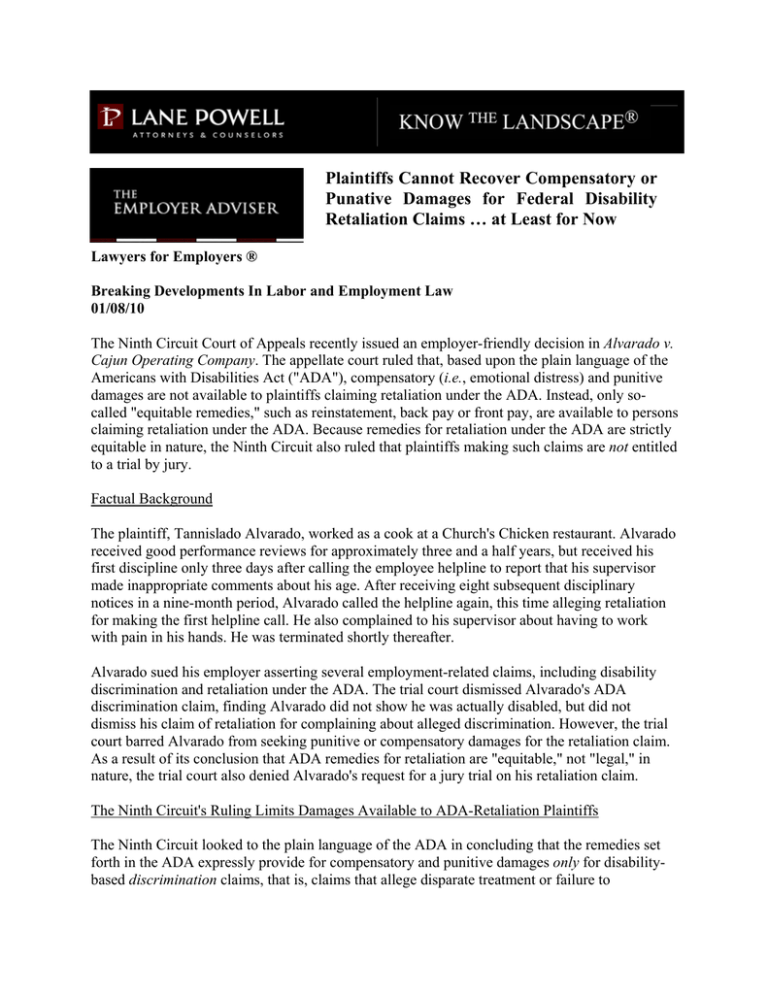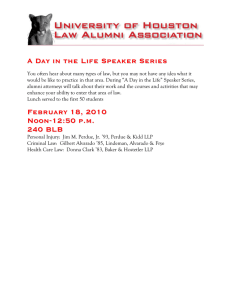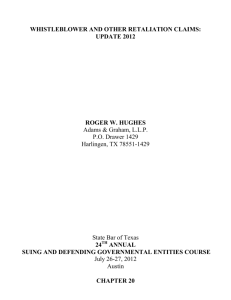Plaintiffs Cannot Recover Compensatory or Punative Damages for Federal Disability
advertisement

Plaintiffs Cannot Recover Compensatory or Punative Damages for Federal Disability Retaliation Claims … at Least for Now Lawyers for Employers ® Breaking Developments In Labor and Employment Law 01/08/10 The Ninth Circuit Court of Appeals recently issued an employer-friendly decision in Alvarado v. Cajun Operating Company. The appellate court ruled that, based upon the plain language of the Americans with Disabilities Act ("ADA"), compensatory (i.e., emotional distress) and punitive damages are not available to plaintiffs claiming retaliation under the ADA. Instead, only socalled "equitable remedies," such as reinstatement, back pay or front pay, are available to persons claiming retaliation under the ADA. Because remedies for retaliation under the ADA are strictly equitable in nature, the Ninth Circuit also ruled that plaintiffs making such claims are not entitled to a trial by jury. Factual Background The plaintiff, Tannislado Alvarado, worked as a cook at a Church's Chicken restaurant. Alvarado received good performance reviews for approximately three and a half years, but received his first discipline only three days after calling the employee helpline to report that his supervisor made inappropriate comments about his age. After receiving eight subsequent disciplinary notices in a nine-month period, Alvarado called the helpline again, this time alleging retaliation for making the first helpline call. He also complained to his supervisor about having to work with pain in his hands. He was terminated shortly thereafter. Alvarado sued his employer asserting several employment-related claims, including disability discrimination and retaliation under the ADA. The trial court dismissed Alvarado's ADA discrimination claim, finding Alvarado did not show he was actually disabled, but did not dismiss his claim of retaliation for complaining about alleged discrimination. However, the trial court barred Alvarado from seeking punitive or compensatory damages for the retaliation claim. As a result of its conclusion that ADA remedies for retaliation are "equitable," not "legal," in nature, the trial court also denied Alvarado's request for a jury trial on his retaliation claim. The Ninth Circuit's Ruling Limits Damages Available to ADA-Retaliation Plaintiffs The Ninth Circuit looked to the plain language of the ADA in concluding that the remedies set forth in the ADA expressly provide for compensatory and punitive damages only for disabilitybased discrimination claims, that is, claims that allege disparate treatment or failure to accommodate. The court noted that the sections providing for such remedies conspicuously omit any reference to the ADA's anti-retaliation provision. The court held that the omission was intentional stating, "Congress may have well-advisedly limited punitive and compensatory damage awards to those plaintiffs who are able to prove discrimination due to actual disability." (Plaintiffs need not prove actual disability to prove retaliation under the ADA.) Thus, the court held that compensatory and punitive damages remedies are not available in ADA retaliation cases, limiting the remedies to reinstatement, back pay and front pay. What Alvarado Means for Employers Congress has previously amended the ADA when it did not agree with judicial interpretations limiting plaintiffs' abilities to maintain and prevail in claims. Here, as well, there is no guarantee that the Alvarado holding will not be "overturned" by Congress through an amendment that explicitly authorizes the remedies sought by Mr. Alvarado and rejected by the Ninth Circuit. Regardless of whether Congress amends the ADA in response to this ruling, Alvarado should not impact employers' commitment to prohibiting and preventing unlawful discrimination and retaliation in the workplace. Alvarado does not change the bottom line: retaliation for protected activity is unlawful under the ADA, as well as other federal and state laws. And, although Alvarado may limit the type of damages available to retaliation plaintiffs under the ADA, equitable remedies can be significant. Further, state laws against discrimination in Washington, Oregon and Alaska explicitly authorize plaintiffs to recover compensatory and emotional distress damages for disability-based retaliation claims. For more information, please contact the Labor and Employment Law Practice Group at Lane Powell: 206.223.7000 Seattle 503.778.2100 Portland 907.277.9511 Anchorage employlaw@lanepowell.com www.lanepowell.com We provide Employer Adviser as a service to our clients, colleagues and friends. It is intended to be a source of general information, not an opinion or legal advice on any specific situation, and does not create an attorney-client relationship with our readers. If you would like more information regarding whether we may assist you in any particular matter, please contact one of our lawyers, using care not to provide us any confidential information until we have notified you in writing that there are no conflicts of interest and that we have agreed to represent you on the specific matter that is the subject of your inquiry. Copyright © 2009 Lane Powell PC Seattle - Portland - Anchorage - Olympia - Tacoma - London 2





